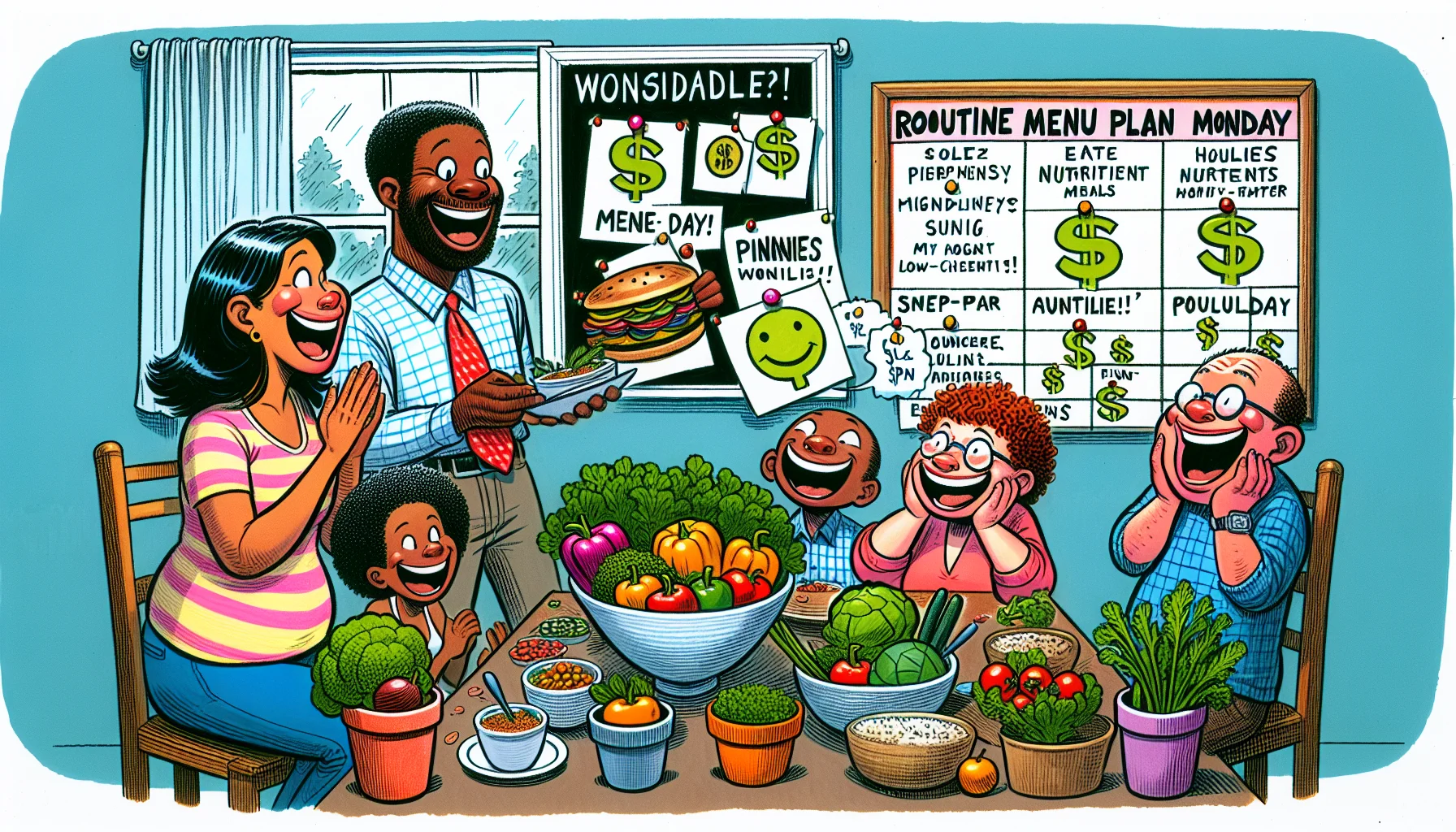Routine Menu Plan Monday Quiz
Test Your Knowledge
Question of
Routine Menu Plan Monday: A Fresh Start to Your Week
Welcome to the concept of Routine Menu Plan Monday, where we embrace the opportunity to kickstart our week on a positive note. Every Monday, we dedicate ourselves to setting the tone for a week of healthy eating through careful and thoughtful menu planning. This initiative is designed to help you make intentional food choices that not only nourish your body but also align with your wellness goals. Let's dive into a week of mindful eating, starting with a fresh and motivating Monday.
Why Plan Your Meals?
Meal planning is a simple yet effective strategy for making your daily life more manageable. By investing a little time each week to plan your meals, you can reap numerous benefits that contribute to both your physical health and mental well-being.
One of the most immediate benefits of meal planning is the amount of time it saves. Knowing exactly what you're going to eat each day eliminates the daily decision-making and last-minute grocery runs. This streamlined process means you can prepare meals faster and more efficiently, leaving more time for other activities.
Additionally, meal planning significantly reduces stress. The question of "What's for dinner?" can be a source of daily anxiety for many, but having a plan in place removes this uncertainty. With meals mapped out, you can relax knowing that one part of your day is already taken care of.
Eating healthier is another key advantage of meal planning. When you plan your meals, you're more likely to make balanced and nutritious choices because you're not making decisions on the fly or resorting to fast food. This proactive approach allows you to include a variety of foods in your diet and ensures that you're meeting your nutritional needs.
Lastly, meal planning is an effective way to minimize food waste. By purchasing only what you need for your planned meals, you're less likely to buy items that will go unused and eventually be thrown away. This not only benefits the environment but also helps you save money by reducing the amount of food that is wasted.
Getting Started: Tips for Effective Meal Planning
- Start by assessing your dietary needs and preferences to ensure your meal plan aligns with your health goals and taste preferences.
- Create a meal planning calendar for the week or month ahead, incorporating a variety of foods to keep your diet balanced and interesting.
- Make a grocery list based on your meal plan to avoid impulsive buys and ensure you have all necessary ingredients for your meals.
- Prep ingredients or entire meals in advance to save time during busy weekdays and to make healthy choices easier.
- Incorporate plenty of fruits, vegetables, whole grains, and lean proteins into your meals to ensure a balanced diet.
- Stay flexible with your meal plan to accommodate unexpected events or changes in your schedule, adjusting as needed.
- Explore new recipes regularly to keep your meal plan exciting and to discover new favorite dishes.
- Listen to your body’s hunger and fullness cues to adjust portion sizes and avoid overeating.
- Drink plenty of water throughout the day to stay hydrated and support overall health.
- Reflect on your meal planning process and eating habits regularly to identify areas for improvement and celebrate successes.
Sample Healthy Menu for Your Monday
| Meal | Menu |
|---|---|
| Breakfast | Oatmeal with sliced bananas and a sprinkle of cinnamon, served with a side of low-fat milk |
| Mid-Morning Snack | A small bowl of mixed berries (strawberries, blueberries, raspberries) |
| Lunch | Quinoa salad with cherry tomatoes, cucumber, feta cheese, and a drizzle of olive oil and lemon juice |
| Afternoon Snack | Carrot sticks with hummus |
| Dinner | Grilled salmon with a side of steamed broccoli and brown rice |
Recipes for Success
Quinoa and Black Bean Salad: A refreshing and nutritious meal, this salad combines the protein-packed quinoa with fiber-rich black beans, vibrant bell peppers, and a squeeze of lime for zest. It's a perfect dish for maintaining energy and supporting muscle health.
Avocado Toast with Poached Egg: Starting your day with this hearty breakfast provides healthy fats from the avocado and high-quality protein from the egg. It's excellent for heart health and keeping you full for longer periods.
Grilled Salmon with Asparagus: Rich in omega-3 fatty acids, this meal is a powerhouse for brain and heart health. The salmon is perfectly complemented by the crisp, grilled asparagus, making it a deliciously balanced meal.
Spinach and Berry Smoothie: Packed with antioxidants and vitamins, this smoothie is a perfect energizing snack. The spinach provides iron, while the mix of berries offers a delightful sweetness and boosts your immune system.
Chicken and Vegetable Stir-Fry: A quick and easy meal that’s full of flavor. Lean chicken breast provides the protein needed for muscle repair, while a variety of vegetables add color, fiber, and essential nutrients to your diet.
Almond Butter and Banana Sandwich: A twist on the classic peanut butter and banana sandwich, using almond butter for an extra dose of vitamin E and magnesium. It’s a simple yet satisfying snack that offers energy and supports brain health.
Kale and White Bean Soup: A comforting and hearty soup, ideal for colder days. Kale is a superfood loaded with vitamins A, K, and C, while white beans add protein and fiber, making this soup a nutritional powerhouse that supports overall health.
Oatmeal with Fresh Berries and Nuts: A warm and filling breakfast that’s rich in fiber and heart-healthy fats. The fresh berries provide a sweet touch and a boost of antioxidants, while nuts add crunch and extra nutrients.
Shopping List Essentials
Fruits
- Apples
- Bananas
- Oranges
Vegetables
- Spinach
- Carrots
- Broccoli
Proteins
- Chicken Breast
- Lentils
- Almonds
Grains
- Quinoa
- Brown Rice
- Whole Wheat Bread
Dairy Alternatives
- Almond Milk
- Coconut Yogurt
- Cashew Cheese
Staying on Track: Tips for the Rest of the Week
Maintaining healthy eating habits throughout the week can be a challenge, especially after the motivation of a fresh start on Monday begins to wane. However, with a few strategic approaches, you can ensure that your good intentions don't fall by the wayside. Here are some tips to help you stay on track with your healthy eating goals for the rest of the week.
Firstly, staying flexible is key. Understand that not every day will go as planned. Sometimes, unexpected events or responsibilities might disrupt your meal planning. When this happens, don't be too hard on yourself. Instead, have a backup plan ready. This could mean having healthy snacks on hand or knowing a few quick and healthy recipes that you can whip up in no time. Flexibility can prevent one off day from derailing your entire week.
Preparing in advance is another crucial strategy. Dedicate some time during the weekend or a less busy day to plan your meals for the week. You can batch cook and store meals in the fridge or freezer, ensuring that you always have a healthy option ready. This not only saves time during the week but also reduces the temptation to opt for less healthy, convenience foods.
Incorporating variety into your meals is also important. Eating the same foods over and over can quickly become boring, which might lead you to crave less healthy options. Try to mix things up by experimenting with different recipes, cuisines, and ingredients. This will not only make your meals more enjoyable but also ensure you're getting a wide range of nutrients.
By staying flexible, preparing in advance, and incorporating variety into your meals, you can maintain healthy eating habits well beyond Monday. Remember, consistency is key to long-term success, so keep striving for balance and variety in your diet.












